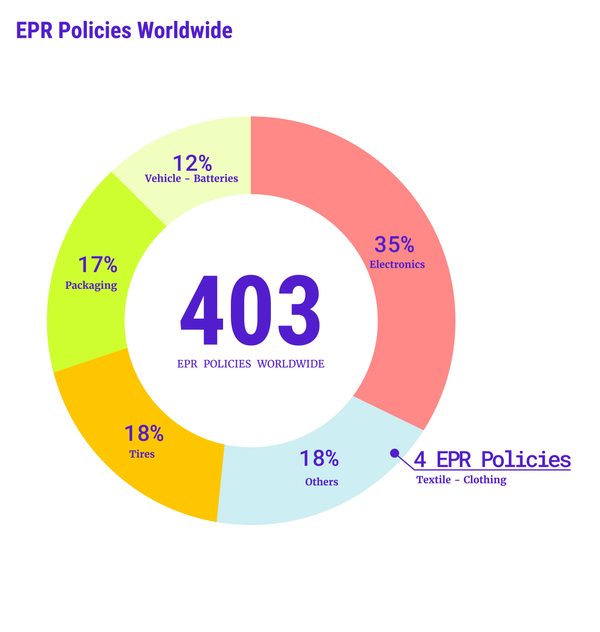Go in depth
Go in depth Contents + Contents -
What is EPR?
Definition
EPR stands for Extended Producer Responsibility.
Extended Producer Responsibility is an environmental policy and a form of product stewardship that extends a producer’s responsibility for a product to the post-consumer stage of a product’s life-cycle. This policy was first coined in the 1990s when the German packaging take-back law was passed."
EPR has yet to reach its potential as a catalyst for the transition from a linear economy to a circular economy
Today there are over 400 EPR programs globally, 35% of which are for electronics, 18% for tires, 17% for packaging, 12% for vehicles / auto batteries and 18% for other sectors such as paint (source: OECD). Only one country has an EPR policy for textiles and clothing – France – and this policy came into effect between 2007-2009, over a decade ago.

EPR in Practice
- Most EPR policies have been devised for commodities that have a smaller reuse market and more predictable (functional) lifespans than clothing.
- The only textiles EPR policy that exists was developed before conversations about overproduction, overconsumption and circularity were mainstream within Global North sustainability discourse. Reducing production volumes is therefore not core to the French EPR policy.
EPR is intended to stop producers from externalizing the cost of Waste and bad design decisions onto municipalities. This has largely been driven by concerns in the Global North regarding the high cost of waste management and the scarce landfill space in their own countries. EPR has, to date, not been concerned with the impact on communities like Kantamanto, “downstream” from the Global North in the global flow of Waste Streams.
In other words, EPR has largely avoided addressing Environmental Justice and Waste Colonialism, in any sector.
The way that the responsibility of waste management is shifted onto the producer can be physical and/or financial. Physical responsibility might look like a producer being required to tangibly take-back, sort and treat their products once consumers are done with them. Financial responsibility is where producers provide the financial resources required to safely and effectively manage the end-of-life of their products. They can provide these funds individually or collectively through a third party called a Producer Responsibility Organization (PRO).
Producer Responsibility Organization
Most EPR Programs are managed by PROs. Oftentimes there is more than one PRO accessible to a company, creating a competitive market, which has both advantages and disadvantages. Refashion, a non-profit, is the sole PRO responsible for administering the French EPR Policy.
The EPR fee, or “eco-contribution”, paid by producers is determined by the PRO but the PRO sets fees according to the budget and goals set by government directives. In the case of Refashion, their budget, methods of implementation and the objectives are determined by the French Ministry of Ecological Transition.
EPR fees have largely been set with the intention of internalizing the cost of safely and effectively managing the end-of-life of products, often with the focus of funding cost-effective and efficient recycling systems. This “management” may include accounting for the cost of collection, sorting, transport and/or recycling as well as the administration of these activities.
Eco-Modulation of EPR Fees
Increasingly, EPR fees are being used to incentivize producers to improve the overall environmental performance of their products. This goal is typically pursued by using a bonus / malus system of eco-modulation, a system that rewards (bonus) producers for doing things like increasing the recycled content in their products, utilizing lighter-weight materials, eliminating complex chemistries in favor of monomaterial products and designing for improved durability, repairability and recyclability.
This is great in theory, but if producers do not feel the burden of waste management then there is little incentive to change entrenched systems, especially that of the overproduction causing Waste in the first place. In addition, eco-modulation has proven to work best, within sectors like packaging, when fees are modulated according to diverse, advanced science-driven criteria that takes into account recyclability within different contexts. Given the universal lack of recycling infrastructure for post-consumer textiles, we believe that eco-modulation is meaningless without clear reduction targets.